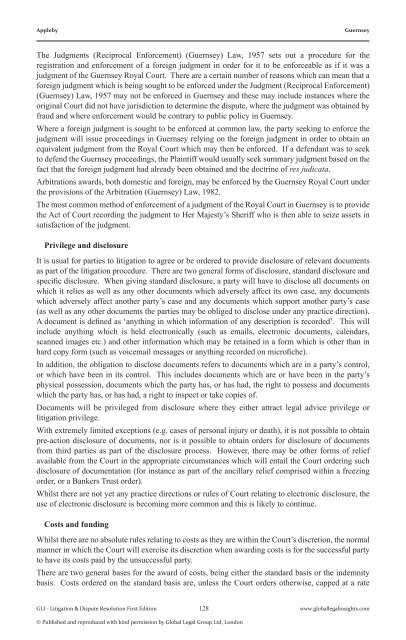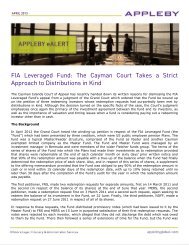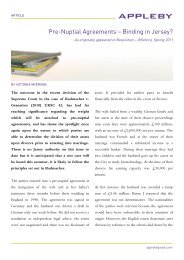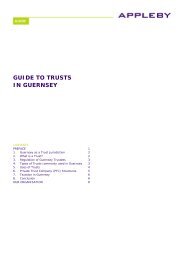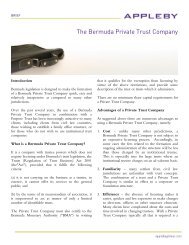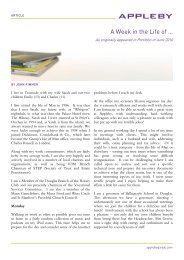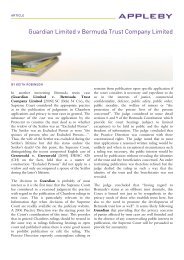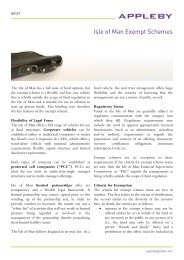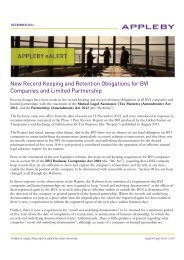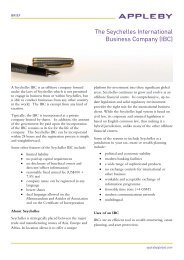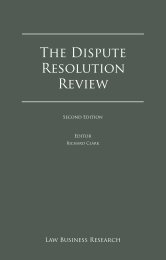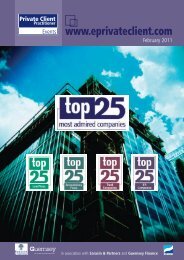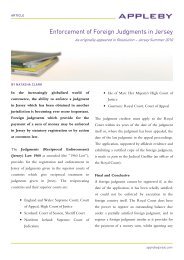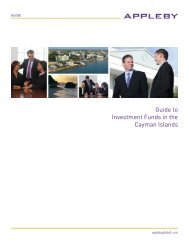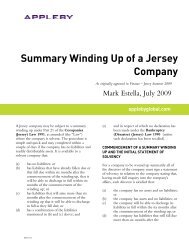Litigation & Dispute Resolution - Appleby
Litigation & Dispute Resolution - Appleby
Litigation & Dispute Resolution - Appleby
You also want an ePaper? Increase the reach of your titles
YUMPU automatically turns print PDFs into web optimized ePapers that Google loves.
<strong>Appleby</strong><br />
Guernsey<br />
The Judgments (Reciprocal Enforcement) (Guernsey) Law, 1957 sets out a procedure for the<br />
registration and enforcement of a foreign judgment in order for it to be enforceable as if it was a<br />
judgment of the Guernsey Royal Court. There are a certain number of reasons which can mean that a<br />
foreign judgment which is being sought to be enforced under the Judgment (Reciprocal Enforcement)<br />
(Guernsey) Law, 1957 may not be enforced in Guernsey and these may include instances where the<br />
original Court did not have jurisdiction to determine the dispute, where the judgment was obtained by<br />
fraud and where enforcement would be contrary to public policy in Guernsey.<br />
Where a foreign judgment is sought to be enforced at common law, the party seeking to enforce the<br />
judgment will issue proceedings in Guernsey relying on the foreign judgment in order to obtain an<br />
equivalent judgment from the Royal Court which may then be enforced. If a defendant was to seek<br />
to defend the Guernsey proceedings, the Plaintiff would usually seek summary judgment based on the<br />
fact that the foreign judgment had already been obtained and the doctrine of res judicata.<br />
Arbitrations awards, both domestic and foreign, may be enforced by the Guernsey Royal Court under<br />
the provisions of the Arbitration (Guernsey) Law, 1982.<br />
The most common method of enforcement of a judgment of the Royal Court in Guernsey is to provide<br />
the Act of Court recording the judgment to Her Majesty’s Sheriff who is then able to seize assets in<br />
satisfaction of the judgment.<br />
Privilege and disclosure<br />
It is usual for parties to litigation to agree or be ordered to provide disclosure of relevant documents<br />
as part of the litigation procedure. There are two general forms of disclosure, standard disclosure and<br />
specific disclosure. When giving standard disclosure, a party will have to disclose all documents on<br />
which it relies as well as any other documents which adversely affect its own case, any documents<br />
which adversely affect another party’s case and any documents which support another party’s case<br />
(as well as any other documents the parties may be obliged to disclose under any practice direction).<br />
A document is defined as ‘anything in which information of any description is recorded’. This will<br />
include anything which is held electronically (such as emails, electronic documents, calendars,<br />
scanned images etc.) and other information which may be retained in a form which is other than in<br />
hard copy form (such as voicemail messages or anything recorded on microfiche).<br />
In addition, the obligation to disclose documents refers to documents which are in a party’s control,<br />
or which have been in its control. This includes documents which are or have been in the party’s<br />
physical possession, documents which the party has, or has had, the right to possess and documents<br />
which the party has, or has had, a right to inspect or take copies of.<br />
Documents will be privileged from disclosure where they either attract legal advice privilege or<br />
litigation privilege.<br />
With extremely limited exceptions (e.g. cases of personal injury or death), it is not possible to obtain<br />
pre-action disclosure of documents, nor is it possible to obtain orders for disclosure of documents<br />
from third parties as part of the disclosure process. However, there may be other forms of relief<br />
available from the Court in the appropriate circumstances which will entail the Court ordering such<br />
disclosure of documentation (for instance as part of the ancillary relief comprised within a freezing<br />
order, or a Bankers Trust order).<br />
Whilst there are not yet any practice directions or rules of Court relating to electronic disclosure, the<br />
use of electronic disclosure is becoming more common and this is likely to continue.<br />
Costs and funding<br />
Whilst there are no absolute rules relating to costs as they are within the Court’s discretion, the normal<br />
manner in which the Court will exercise its discretion when awarding costs is for the successful party<br />
to have its costs paid by the unsuccessful party.<br />
There are two general bases for the award of costs, being either the standard basis or the indemnity<br />
basis. Costs ordered on the standard basis are, unless the Court orders otherwise, capped at a rate<br />
GLI - <strong>Litigation</strong> & <strong>Dispute</strong> <strong>Resolution</strong> First Edition 128 www.globallegalinsights.com<br />
© Published and reproduced with kind permission by Global Legal Group Ltd, London


